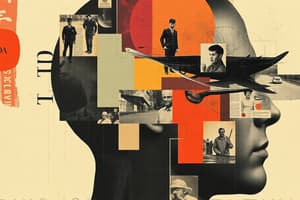Podcast
Questions and Answers
What principle states that a moving object receives more attention than an object that is stationary?
What principle states that a moving object receives more attention than an object that is stationary?
The principle of motion
How does color impact an individual according to the text?
How does color impact an individual according to the text?
Color has a psychological impact on an individual, with some colors acting as stimulants and others as depressants.
Why would it be incongruous to use black toothpaste?
Why would it be incongruous to use black toothpaste?
It would be incongruous to use black toothpaste because some products, such as toothpaste, are in a limited range of colors.
What external factor influences attention based on standing out against the background or not meeting expectations?
What external factor influences attention based on standing out against the background or not meeting expectations?
How does learning influence perception according to the text?
How does learning influence perception according to the text?
What psychological concept plays a significant role in perceptual selectivity according to the text?
What psychological concept plays a significant role in perceptual selectivity according to the text?
Which factor leads older senior executives to criticize the new, young managers for their decision-making abilities?
Which factor leads older senior executives to criticize the new, young managers for their decision-making abilities?
How do needs impact perceptual selectivity, as described in the text?
How do needs impact perceptual selectivity, as described in the text?
In what way do age differences affect perception based on the text?
In what way do age differences affect perception based on the text?
How does job rotation relate to perceptual selectivity, according to the text?
How does job rotation relate to perceptual selectivity, according to the text?
What is likely to happen when a thirsty person sees sand from a distance in a desert, according to the text?
What is likely to happen when a thirsty person sees sand from a distance in a desert, according to the text?
Which group is more likely to resist change based on perceptions, as described in the text?
Which group is more likely to resist change based on perceptions, as described in the text?
Why do older senior executives complain about young managers' inability to take tough decisions and pay attention to details?
Why do older senior executives complain about young managers' inability to take tough decisions and pay attention to details?
What perception issue arises when an individual reads 'Mac-Hinery' instead of 'machinery', as discussed in the text?
What perception issue arises when an individual reads 'Mac-Hinery' instead of 'machinery', as discussed in the text?
How does resistance to change manifest in perceptual differences between older and younger managers?
How does resistance to change manifest in perceptual differences between older and younger managers?
Flashcards are hidden until you start studying
Study Notes
Perceptual Process
- Perception is a process of receiving and interpreting stimuli, involving a series of steps.
- The process begins with receiving stimuli, which enter our organism through sensory organs (vision, hearing, smell, touch, taste, and kinaesthesis).
Selecting Stimuli
- Not all stimuli received by the human organism are accepted by it; some stimuli are noticed and others are screened out.
- The process of filtering information received by our senses is called selective attention.
- Several factors influence selective attention, including external and internal factors.
External Factors Influencing Selection
- Nature: Pictures attract attention more rapidly than words, and pictures with human beings attract attention more readily than the same passage presented as a narrative.
- Location: The best location of a visual stimulus for attracting attention is directly in the front of the eyes and in the center of a page.
- Color: Color is used to attract attention and portray realism, and has a psychological impact on an individual.
- Size: Generally, objects of larger size attract more attention than do smaller ones.
- Contrast: External stimuli that stand out against the background or are not what people are expecting will receive attention.
- Movement: A moving object receives more attention than an object that is stationary.
- Repetition: A repeated external stimulus is more attention drawing than a non-repetitive one.
- Novelty and Familiarity: Either a novel or a familiar external situation can serve as an attention getter.
Internal Factors Influencing Selection
- Learning: Learning creates expectancy in people, and people tend to perceive what they want to perceive.
- Psychology needs: Needs play a significant role in perceptual selectivity, and unreal things often look real because of deprived needs.
- Age difference: Older and younger individuals may have different perceptions and attention to details due to age differences.
Perceptual Organization
- Perceptual organization is the process by which people group stimuli into recognizable patterns.
- There is much to learn about how the human mind assembles, organizes, and categorizes information.
Studying That Suits You
Use AI to generate personalized quizzes and flashcards to suit your learning preferences.




